Ghana’s International Air Borders Opens September 1, 2020
President Nana Akufo-Addo, in his sixteenth update on enhanced measures to defeat the Covid-19 coronavirus pandemic, announced the reopening of the country’s borders by air. After several weeks of thorough work, the president said he was satisfied that it was safe to open. “I’m glad to announce that Kotoka International Airport will reopen and resume operations from Tuesday 1st September 2020,” he said in his address to the nation.
All international airlines have been informed and briefed on the protocols that have been put in place to keep the country’s continued proactive measures against the spread of the virus. It was noted that the first few cases were imported from travellers arriving in Ghana and that the country will remain vigilant to prevent this from happening again.
There have been protocols put in place to maintain Ghana’s dedication to prevent new importations of the virus with the open borders. Any passenger arriving in Ghana must have a copy of a negative Covid-19 PCR test result from an accredited laboratory in their country of origin. They must have completed the test within 72 hours of travel. All arriving passengers in Ghana must we wearing face masks as they disembark, and they will undergo mandatory Covid-19 testing at the airport terminal. The fees for the test would be the responsibility of the passenger. Results would be available within 30 minutes and those who test negative are free to go to their destination and must observe all covid-19 precautionary measures. Those who test positive would be handled by health authorities.
Ghana’s borders have been closed since March leaving many travellers stuck both in and out of the country. There are also several diasporans who had trips planned to Ghana that were cancelled or postponed. Many of them have been anticipating the reopening of Ghana’s borders. The border reopening is welcome news to those who have been anxious to either leave or return to Ghana. The president added that borders by land and sea are still closed to human traffic until further notice.
Ghana receives global Safe Travels Stamp from World Travel & Tourism Council (WTTC)
Ghana has become the latest recipient of the world’s first-ever global Safe Travels Stamp, (formerly safety and hygiene stamp), launched recently by the World Travel & Tourism Council (WTTC).
The stamp created by the WTTC in May this year, allows travellers to identify destinations and businesses around the world which have adopted the global standardised health and hygiene protocols.
A statement issued by the WTTC which represents the global Travel & Tourism private sector said the United Nations World Tourism Organisation (UNWTO) has welcomed the Safe Travels Stamp, which places the safety and hygiene of travellers as a top priority.
The WTTC President & CEO, Gloria Guevara said: “Our Safe Travels Stamp continues to go from strength to strength and we are delighted to see even more popular countries and destinations from all corners of the world adopt our global health and hygiene protocols.
“The stamp also recognises the introduction of new measures by governments around the world which positively impact the Travel & Tourism sector, and to that end, we applaud the government of Ecuador for implementing new measures at Quito airport.
“The continued success of the WTTC Safe Travels Stamp demonstrates its importance not only to countries, destinations and businesses around the world, but crucially travellers, and the millions of people around the world who work in and depend on, a thriving Travel & Tourism sector.
“The stamp is critical to re-establish consumer confidence in our sector and ensure travellers can rest assured that enhanced standards of hygiene are in place and they can once again experience ‘Safe Travels’.”
Ghana’s Minister of Tourism, Arts and Culture, Hon Barbara Oteng-Gyasi said: “We are delighted with this milestone of a Safe Travels Stamp for Ghana. Since March 21, 2020, when our borders were closed, we have worked on creating a safe environment for our Tourism and Travel practitioners. The protocols we have put in place are borne out of a shared responsibility to create a hygienic and safe destination.
“With the gradual easing of restrictions, we believe these measures will boost confidence in our tourism and hospitality sector. We congratulate the WTTC for instituting these Safe Travels protocols which is a welcome addition to the tourism industry.”
Since the launch of the WTTC Safe Travels Stamp, destination countries and cities, around the world have now adopted WTTC’s new protocols, including holiday heavyweights such as Tunisia, Indonesia, Egypt, Turkey, Portugal, Kenya, Mauritius and Dubai.
As part of its Safe Travels protocols, the worldwide measures provide consistency and guidance to travel providers and travellers about the new approach to health, hygiene, deep cleansing and physical distancing, in the ‘new normal’ of COVID-19 world.
The protocols were devised following the experience of WTTC members dealing with COVID-19 and based on guidelines from the World Health Organisation (WHO) and the Centre for Disease Control and Prevention (CDC).
According to WTTC’s 2020 Economic Impact Report, during 2019, Travel & Tourism was responsible for one in 10 jobs (330 million total), making a 10.3% contribution to global GDP and generating one in four of all new jobs.
Source: Graphic Online
COVID-19 guidelines released ahead of reopening of airport on Sept 1
The Ghana Health Service (GHS) has written to the management of the Kotoka International Airport (KIA) detailing safety protocols for the resumption of international air travel amidst the COVID-19 outbreak.
Authorities of the health management body say they have identified overcrowding as one of the major factors contributing to the spread of the virus hence the instituted measures to stem the rate of infection during the easing of COVID-19 restrictions on flight travel.
The GHS says in view of this, the Ghana Airports Company Limited must demonstrate it would not be a place for the transmission of the virus.
Key amongst the four measures is for the airport management to ensure that there is no form of congestion at the facility while ensuring strict adherence to social distancing and compulsory wearing of face masks protocols.
Below are the measures the GHS has ordered KIA to put in place:
1. Ensure there is no congestion at all sections of the airport (arrival, departure and environs) to fail adherence to social distancing protocols.
2. Compulsory mask wearing for all passengers (both arriving and departing) as well as staff
3. Temperature monitoring to continue at both arrival and departure terminals
4. Ensure social distancing and compulsory mask-wearing at the car parks and in front of all terminals.
Ghana Health Service is hopeful should these measures be operationalized and strictly adhered to, the potential risk of COVID-19 transmission at the Kotoka International Airport as a result of the reopening of the country’s air border will be minimal.
It has also assured the airport management of its highest form of cooperation to “develop the enabling protocols for ensuring passengers and staff safety.”
Recently, President Akufo-Addo hinted the country is preparing to reopen its airports to human traffic.
According to the president, he has instructed the Ministry of Aviation, the Ghana Civil Aviation Authority and the Ghana Airports Company Limited to work with the Ministry of Health and its agencies, to ascertain the country’s readiness to reopen the airport.
Already, the GHS has said it was engaging various stakeholders to come up with modalities to ensure all persons who arrive in the country are tested for COVID-19 ahead of the possible opening of air borders in September.
Ghana’s air, sea and land borders were closed on Sunday, March 22, 2020, as part of efforts to stop the spread of COVID-19 in the country.
The closure left thousands of Ghanaians who have consistently appealed for help over the last few months stranded abroad.
The President reminded Ghanaians that “special dispensation will continue to be given for their evacuation back to Ghana.”
But the government’s pre-condition for evacuation was that the stranded citizens bear the full cost of their ticket 14-day mandatory quarantine when they arrive in the country because of the threat of the novel coronavirus.
In some instances, the government has subsidized the cost of travel and quarantine.
Source: citinewsroom
‘Beyond the Return’ Diaspora Features Zakisha Brown – Jamaican Canadian Hip Hop Artist
Zakisha Brown is a Jamaican-Canadian artist who has two singles that have made her known as a hit-maker inspired by her visit to Ghana. ‘Went to Ghana’ and ‘Africa Home Again’ are both catchy Hip Hop songs she released shortly after returning to Canada, after spending a few months in Ghana. The first release, ‘Went to Ghana’ quickly gained popularity on social media and then became a theme song used by popular Ghanaian YouTuber, Wode Maya, exposing her song to his nearly 500,000 Subscribers.
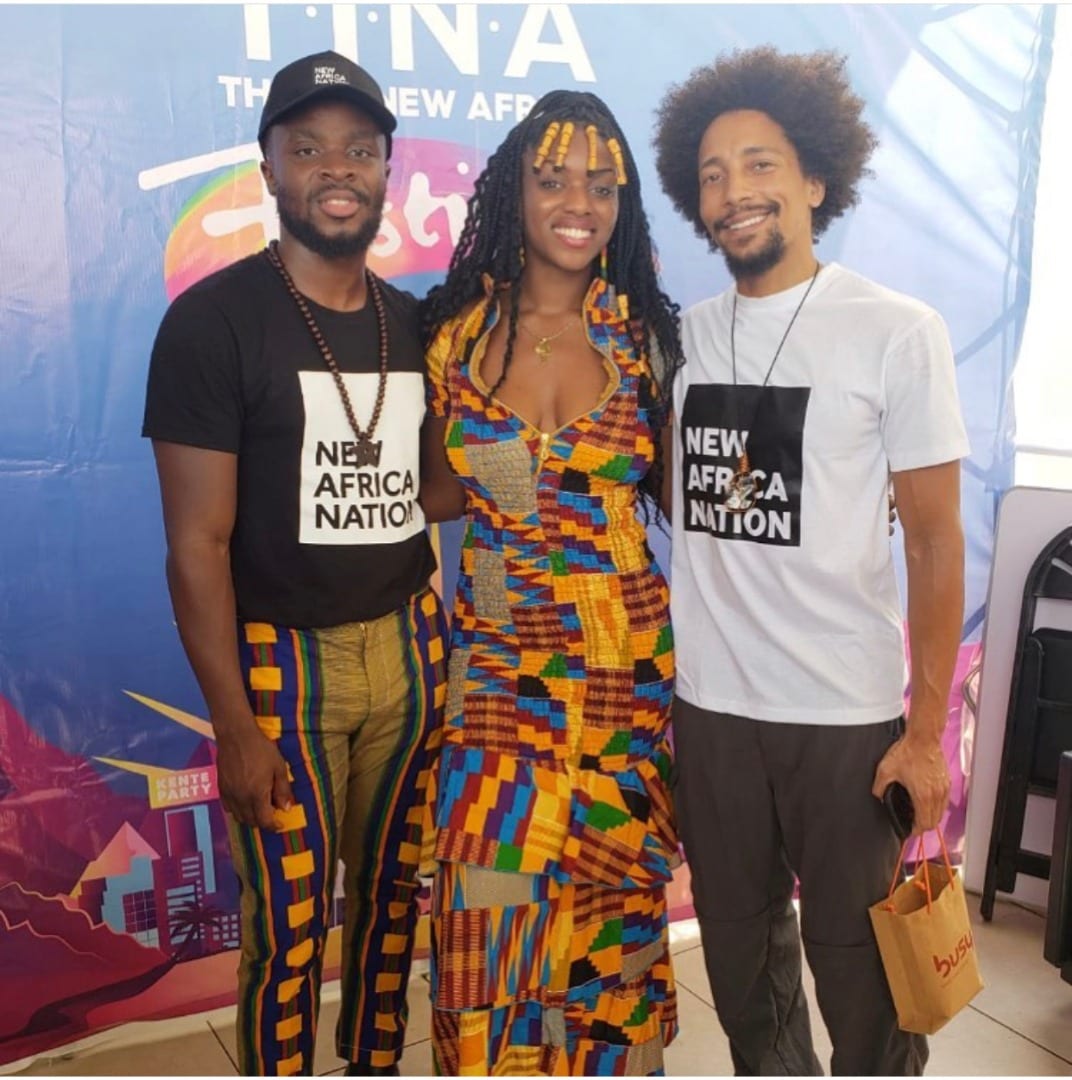
Zakisha says she fell in love with music and began experimenting with lyrical expression over 10 years go. But it was four years ago when she began to perform as a professional music artist. In Canada, the black community is filled with diversity and with the country’s promotion of multi-culturalism, most people stay true to their family’s heritage and culture.
As a Jamaican, Zakisha has always known about her Caribbean heritage. She says it was at age 14 when her parents were considering a move to Ghana. It was then that she learned about Queen Nanny of the Maroons and the connection between Jamaica and West Africa; especially Ghana. She says she learned that Jamaicans predominantly came from West Africa, which sparked her curiosity about Ghana as a young teen.
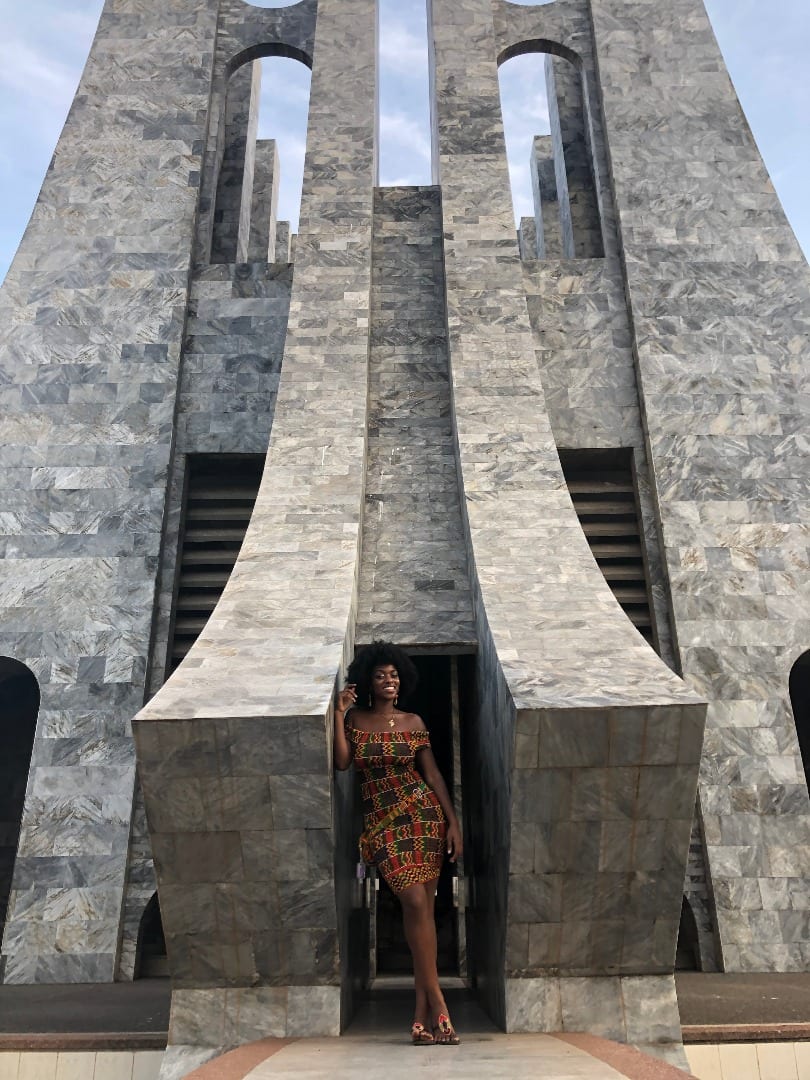
Fast forward to 2019 and her Hip Hop music career was her golden ticket that brought her to Ghana. She was given the opportunity to perform in the artist showcase at the Afrochic Diaspora Festival as part of the Year of Return. “I think it’s extremely important to establish the connection between Jamaicans and Ghanaians because of the history we have,” she said. “There are Maroons to this day in Jamaica who speak Twi, but have never been to Ghana in their life.” She believes that once we continue to bond, we will bridge the gap and be able to create a sense of unity and solidarity.
Coming to Ghana was a deeply meaningful experience for Zakisha. Everywhere she went she says she saw how similar Ghanaians and Jamaicans are and that recognizing our similarities is the first step acknowledging our roots. She referred to a quote from Marcus Garvey, “A people without the knowledge of their past history, origin and culture is like a tree without roots.” She feels in order for us to connect with our roots and build a better place for future generations, we must develop self knowledge.
As an artist, so many things inspired her when she was in Ghana and she was happy it was so easy to connect and collaborate with people when she was in the country. “I was heavily inspired by the people I met, the delicious food I ate, the attractive melanated men, the regal Queens, the intelligence of children and how independent, strong and resourceful Ghanaians are.” All these influences are evident in the lyrics of her hit song “Went to Ghana.”
“Strongest backs they manage Nuff, too cool they balance food with no hands this ain’t a bluff, necks strong they’re very tough made me just level up.”
~ Lyrics from Went to Ghana Hit song.
She didn’t know any artists personally when she came to Ghana, but she managed to connect with people in the local creative community to work with on her projects. “I collaborated with the infamous DWP Dance Academy for my music video ‘Africa Home Again’, the Rising Afrobeat Stars Djay and Majorskyscrapa.” She also met African American Spoken Word Artist, L.N. Wyman, who appears at the end of her track in the video for ‘Africa Home Again’.
The spirit of pan Africanism was also a strong influencer as she learned about Ghana’s first President. “I was also inspired by the genius of President Kwame Nkrumah and how he worked to gain independence in Ghana while also working to unite other African Countries. I could go on and on,” she said. “It was all life changing so I had to write it in my music.”
“As an artist you never truly know the impact your song will have with the world,” she responded when asked how she felt about the popularity her song was having. The likes of Reggie Rockstone, Wode Maya and Fuse ODG, Reggae Group, Morgan Heritage have all shared her songs on their platforms which helped her reach over 1 million people. She said it’s been a mind-blowing and absolutely awesome experience. “It shows the love people have for Ghana and great music.”
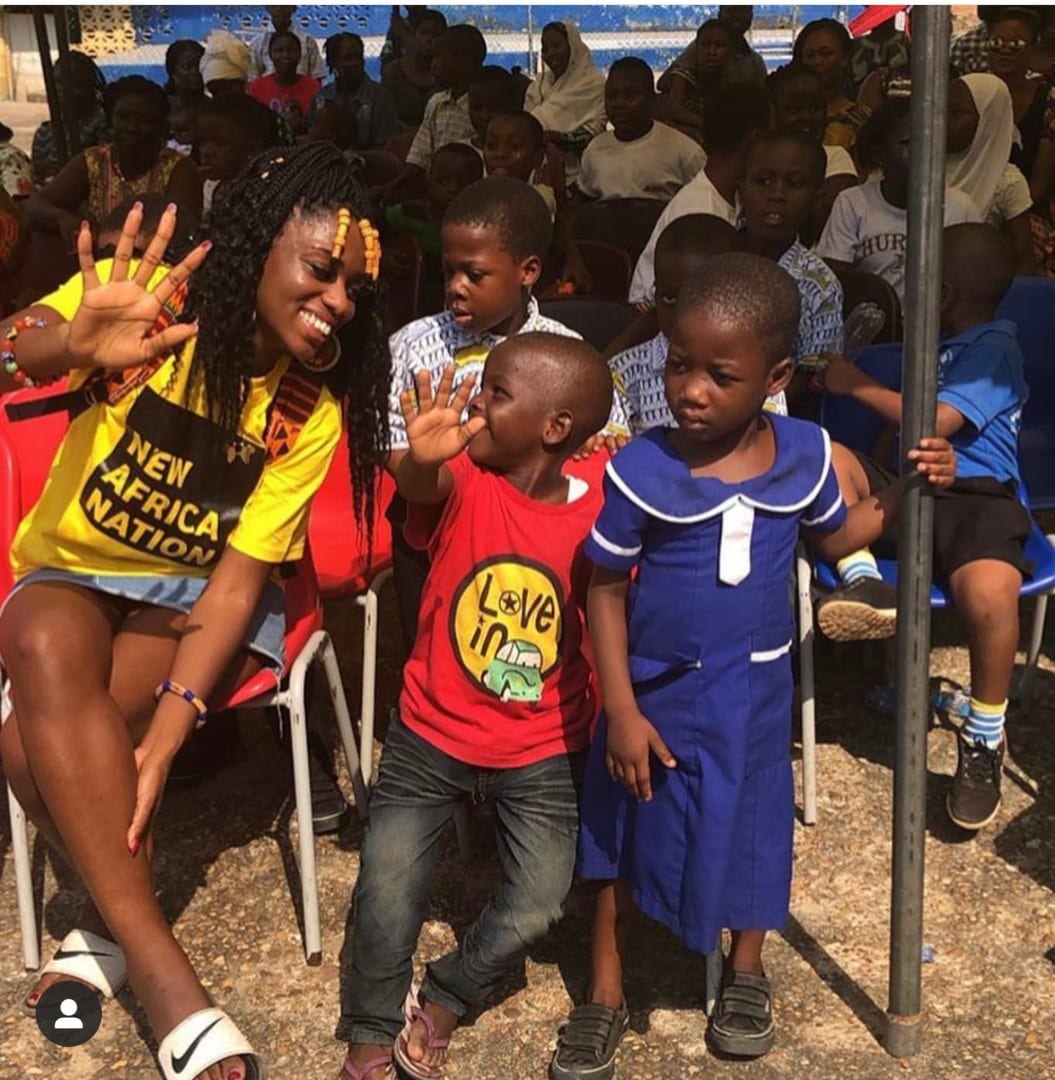
She took in several experiences while in Ghana and felt it was important to take the time to give back to the community. She said her most positive experience was seeing all the work that artist FUSE ODG, activist Chaka Bars, and Music Manager Andre Hackett were doing in Akosombo building and supporting a school. She travelled with FUSE and his team as they embarked on the project on New Year’s Day. “I ended up meeting strangers who turned into friends along the way,” she said. “We spoke with the children there, painted rooms they were developing, enjoyed dance performances by the students and ate amazing food.” After the day of servicing the youth was completed, she enjoyed a boat ride with newly found friends through Lake Volta.
Zakisha has plans to return to Ghana very soon and has plans to make some investments in the country. She hopes the borders open before her planned trip so she can continue with reconnecting to the motherland. “I will be returning for another three months in November. I bought my tickets in March, so hopefully the borders will open back up!”
She finds it disappointing when she hears of people who still carry the negative mindset about Africa. “Being African means you are a descendant from royalty, strength, resilience, intelligence power, beauty, love and community,” she said. “They didn’t take slaves when they took us, they took doctors, naturopaths, healers, scientists, mathematicians, midwives, teachers and more….For those who have a negative view [on Africa], they need to see it for themselves; the beauty of Africa.
Once they step foot on the soil, their life with change.”
Written by Ivy Prosper
Emancipation Day Virtual Panel Discussion on Leveraging Our Resilience; Black Lives Matter
Every year, since 1998, Ghana celebrates Emancipation Day with a series of activities that honour leaders of the Pan African movement and celebrate the day when slavery was abolished in most British Colonies on August 1, 1834. This year, due to the Covid-19 pandemic, and restrictions on crowds and the number of attendees at events, adjustments were made to accommodate and still have significant conversations to learn and grow from our past.
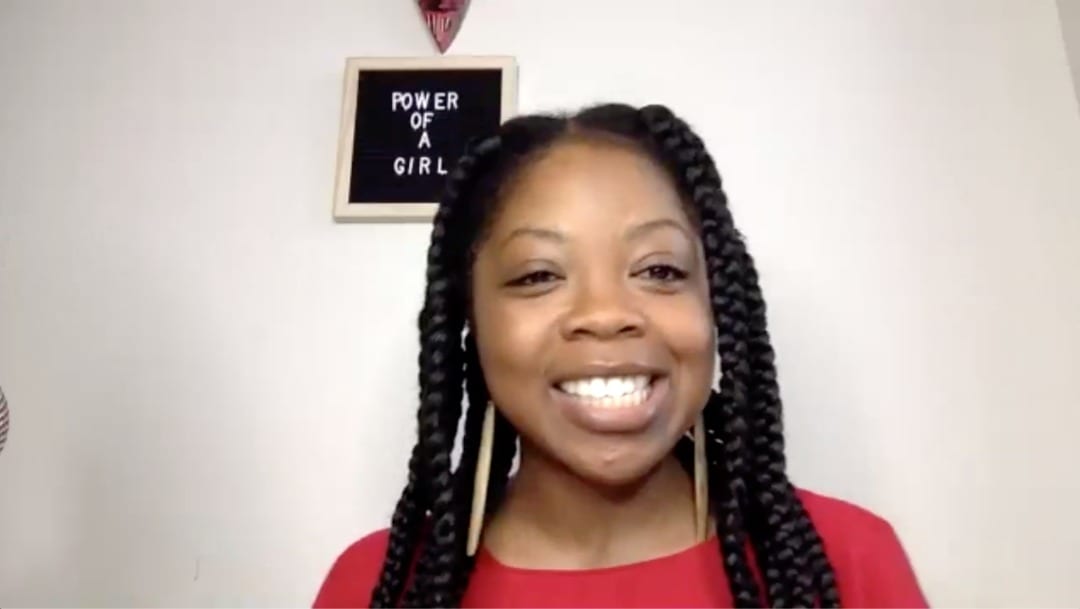
This year, a Virtual Panel Discussion was held on 28th July via the Zoom Webinar platform. Moderated by Aisha Addo, founder of the Power to Girls Foundation, the panel’s theme was Leveraging Our Resilience; Black Lives Matter. The panelists included African American Actor and Activist, Lou Gosset Jr., Pan Africanist, Professor Kojo Yankah, Leader of Diaspora Coalition of Ghana, Rabbi Kohain Halevi, and Author, Lala London.
The conversation’ theme was in response to the ongoing racial protests sparked by the death of George Floyd, who was killed by a Minnesota Police Officer in May. Since then, the Black Lives Matter movement has become a global phenomenon working to topple racist institutions in the U.S., Canada, the U.K., and Europe. Black people are standing up and speaking out against the institutionalized racism that exists in law enforcement and other systems.
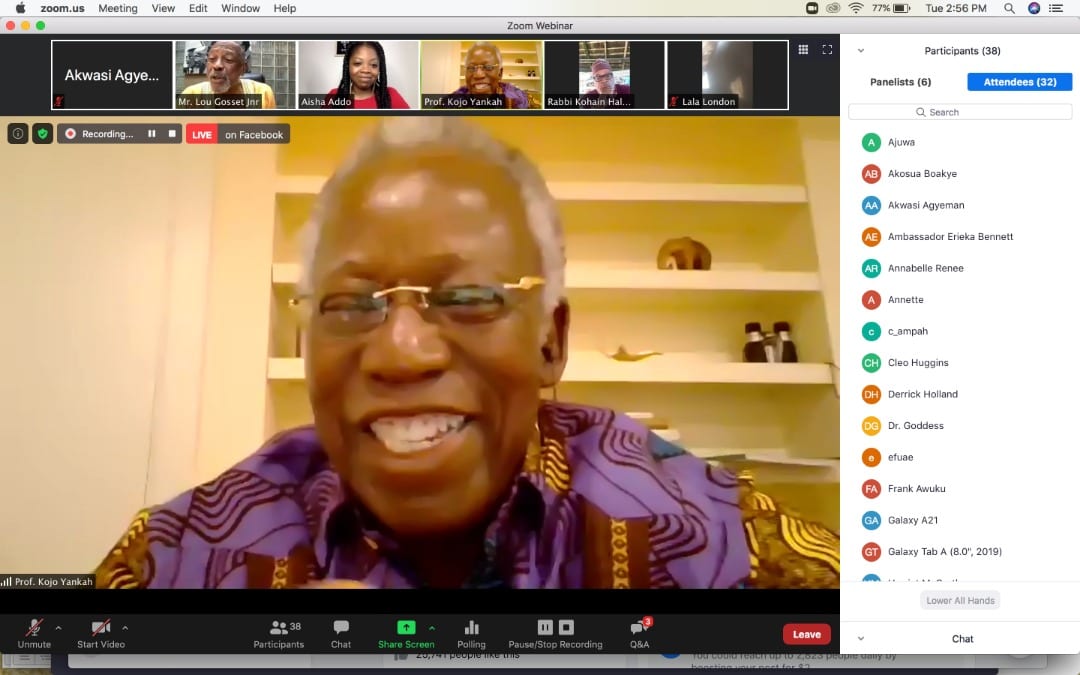
The notion of Africa as home, is becoming a renewed conversation and the pan African movement has been re-awakened. Professor Kojo Yankah, was the former Chairman of the PANAFEST Foundation for over a decade and has been a part of the pan African movement for most of his career. He said that black lives have mattered from early history when the royal African civilization was destroyed by the Greeks. He said that everything about the black person, the African, was destroyed and it continued through the period of slavery. “The culture of the African was further destroyed, not only by getting the Europeans to put their needs on the head of Africans, but they destroyed the humanity of the African….they were successful in getting the African to feel inferior,” he said.
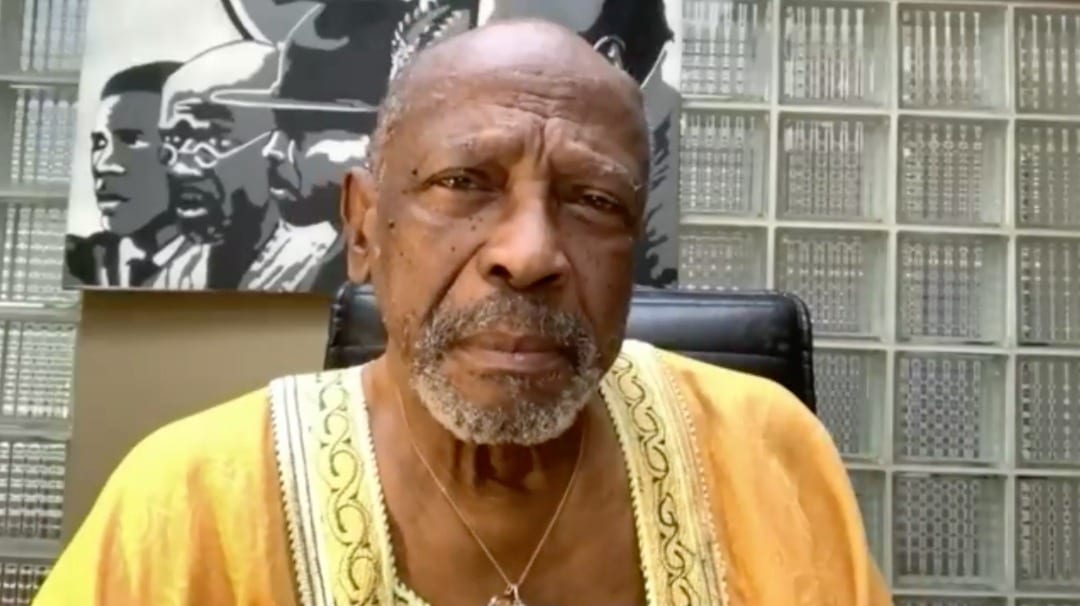
Lou Gosset Jr. is an award-winning African American Actor and Activist. He is he great-grandson of a slave and took a DNA test that revealed he is of Liberian and Sierra Leonean descent. His role in the 1977 miniseries ‘Roots’ catapulted him to stardom. On the panel discussion he shared his sentiments on the first time he traveled to the continent of Africa. “What I heard about Africa, is nothing in comparison to what I saw,” he said. “I could not wait to go back home and be proud to talk about what I found out.” The way Africa is often portrayed, many first-time visitors are surprised by what they see. He suggested therefore it is important for people in the diaspora to make their own journey and see Africa for themselves to break and dispel the myths.
As someone working in the creative industry of film, he also spoke about the roles he has played and how it is part of the narrative. Yankah added that our history did not start with slavery and it is important for our filmmakers and writers to get to work creating our stories, so we are not so narrow-minded.
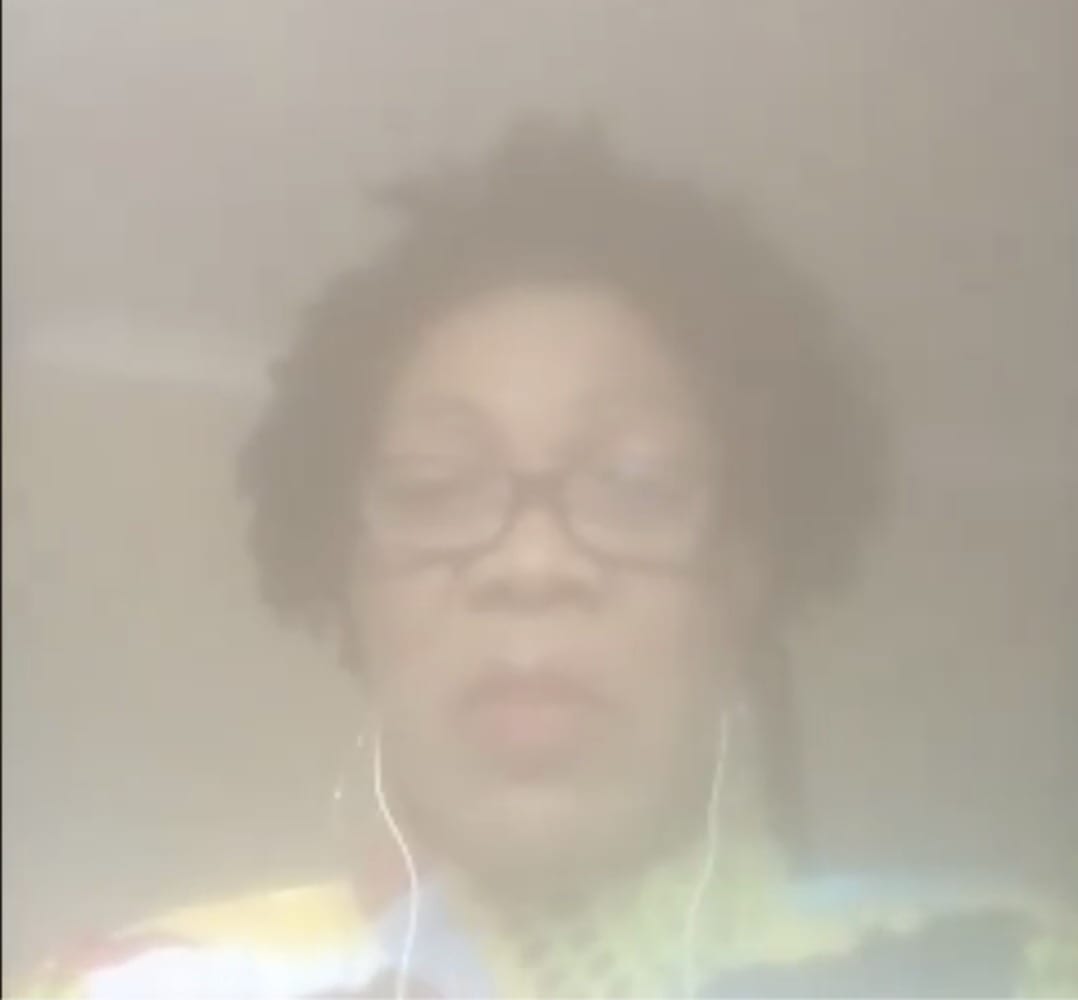
Author, Lala London, came to Ghana on a visit from St. Vincent and the Grenadines before the pandemic. Like many travelers, she is in the country until borders open. During the discussion, she said, “My own grandfather was the son of a slave….so these issues are really dear to me.” She spoke of how the Black Lives Matter movement affects her directly, having a son who is an African American. “We see what happens every day in a country that is supposed to be the bastion of democracy…where black lives somehow just don’t matter,” she added.
Moderator Aisha Addo asked the panel what actionable steps can we use to drive the concept of unity and moving forward across the diaspora and in Africa? Rabbi Kohain Halevi answered her saying, “I think we need to set a new paradigm for what a model society should be today….we have to surpass the model in current existence…include respect for human rights.” He continued by explaining that slavery was a mental construct that set a mental state in our people and we need to work towards dismantling that before we can think of reconstructing it.
Mr. Gosset said that we need to work on our communication. Being an elder, he said he sees the importance in that now. Unity is perhaps the most important part of progress in the black community both in Africa and the diaspora. Sometimes we see a division between the African Americans and the continental Africans, and we need to bridge the gap. He added that, “We cannot make it unless we add our Africans to the fight.”
Ms. Addo asked for one power statement from the panelists before wrapping up the Virtual Discussion and Professor Yankah give a meaningful response. “Since we are also commemorating Emancipation, I would like to hammer the point made that we need to get all our creative people to now focus on what we have lost,” Professor Yankah said, “…we need themes that unite and revive the consciousness of our people…in terms of being proud of who we are and raising the consciousness of blackness.”
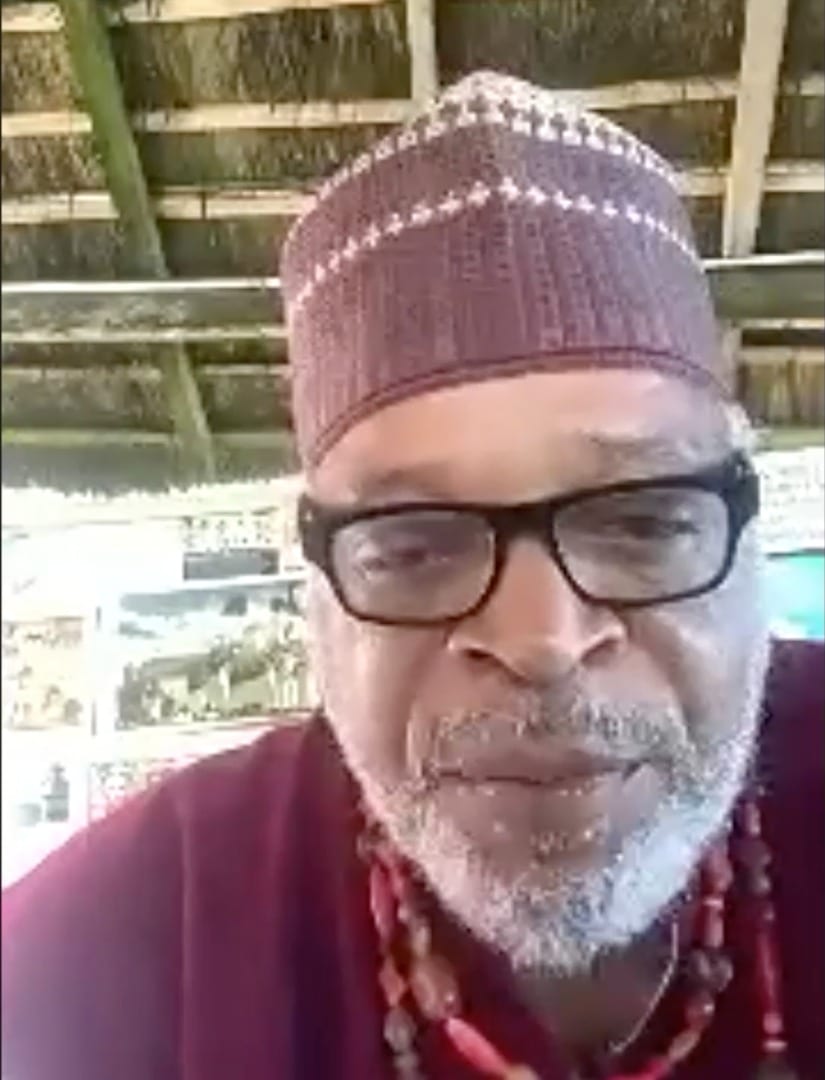
Rabbi Kohian said that during the season of Emancipation we should remember to emancipate ourselves from mental slavery. “If we are not for ourselves, who will be for us?”
By: Ivy Prosper
AfCFTA Secretariat Building Officially Commissioned and Handed Over in Accra, Ghana
It was a historic day for Africa as the African Continental Free Trade Area (AfCFTA) Secretariat building was officially commissioned and handed over on Monday 17th August 2020 in Accra, Ghana. President of the Republic of Ghana, Nana Addo Dankwa Akufo-Addo, was in attendance and delivered a keynote address. The president said that he has no doubt that the coming into being of the African Continental Free Trade Area is one of the most important decisions taken by the African Union.
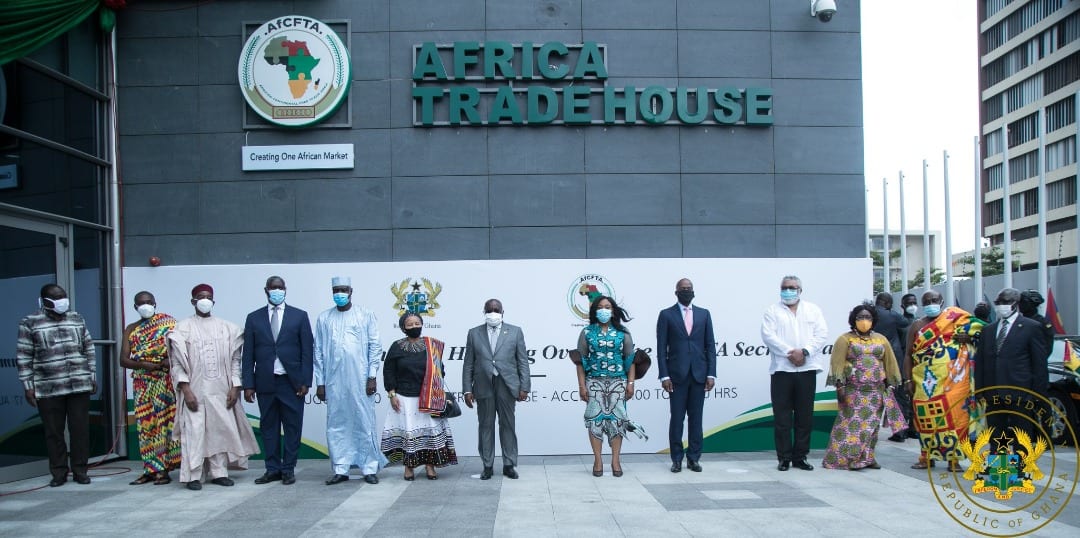
He announced that Ghana fulfilled her obligations and was handing over a “fully furnished and befitting office space, in a secured and easily accessible location within the business centre of Accra, as a permanent Secretariat of the AfCFTA.” The formation of AfCFTA, is truly the realization of pan African visionary and first President of Ghana, Kwame Nkrumah, who was one of the Founders and Organisation Heads of the Organization of African Unity (OAU).
Hon. Shirley Ayorkor Botchwey, Minister for Foreign Affairs and Regional Integration said that part of the agenda when the OAU, now known as the African Union (AU), was founded, was for African countries to explore their full potential in order to better negotiate on a global scale. She said that the Africa we want has a shared framework and we know the road ahead will not be easy. “Our belief must be in ourselves and in our collective abilities as Africans,” she said.
One sentiment expressed by all speakers was how important regional integration is and the significance of the AfCFTA’s role in deepening trade within the continent. President Akufo-Addo spoke of how the economic integration of Africa will lay a strong foundation for an Africa Beyond Aid. He also said, “The pandemic has heightened the importance of the success of the AfCFTA. The disruption of global supply chains has reinforced the necessity for closer integration amongst us, so that we can boost our mutual self-sufficiency, strengthen our economies and reduce dependence on external resources.”
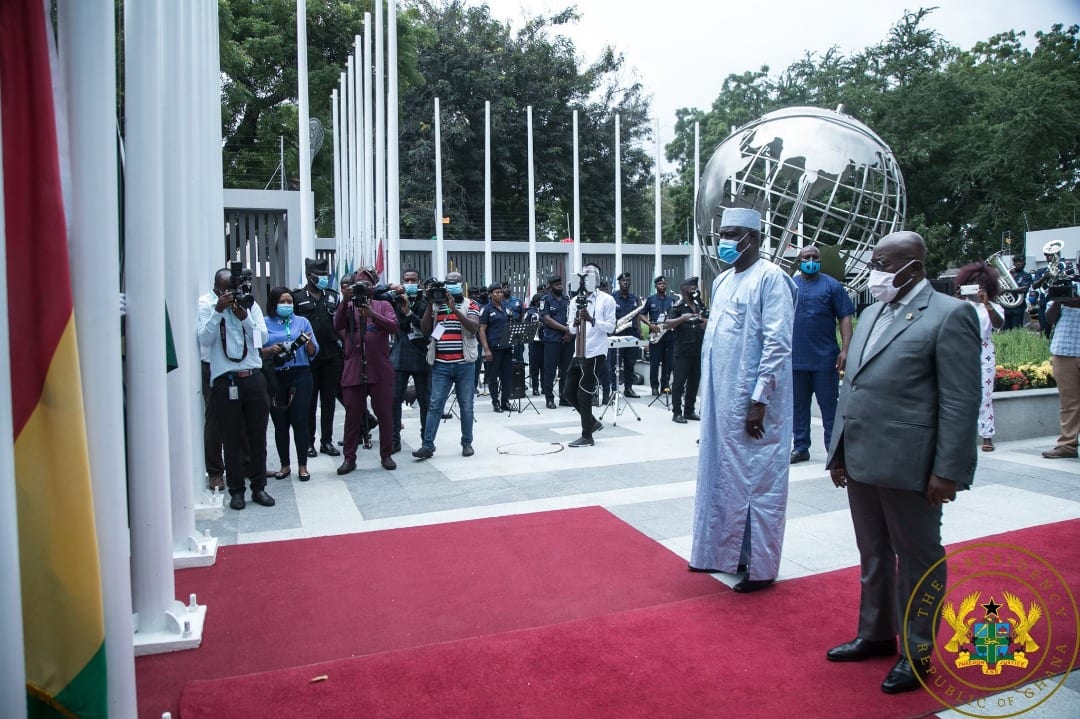
H.E. Wamkele Keabetswe Mene, is the first elected Secretary-General of the AfCFTA Secretariat and commended Ghana for her contribution to the pan Africanist movement. “Since the end of colonialism, the Republic of Ghana has been at the forefront of the integration of Africa,” he said, “…so it’s significant that the AfCFTA Secretariat is in Ghana.” He said that Africa has the potential to be a catalyst to improve the continent’s competitiveness in its own markets as well as internationally.
Hon. Alan Kyerematen, Minister for Trade and Industry Ghana, said, “Less than 15% of Africa’s total trade occurs within the region. The paradox of Africa being the richest continent and yet the poorest could partly be attributed to this unfortunate situation.” He stressed the importance of everyone involved to have a level of sustained commitment for the effective implementation of AfCFTA. He said he was confident that all challenges can be addressed when working together. He implored everyone to “Be inspired by the prospect of success in realizing our vision of a single united market for Africa.”
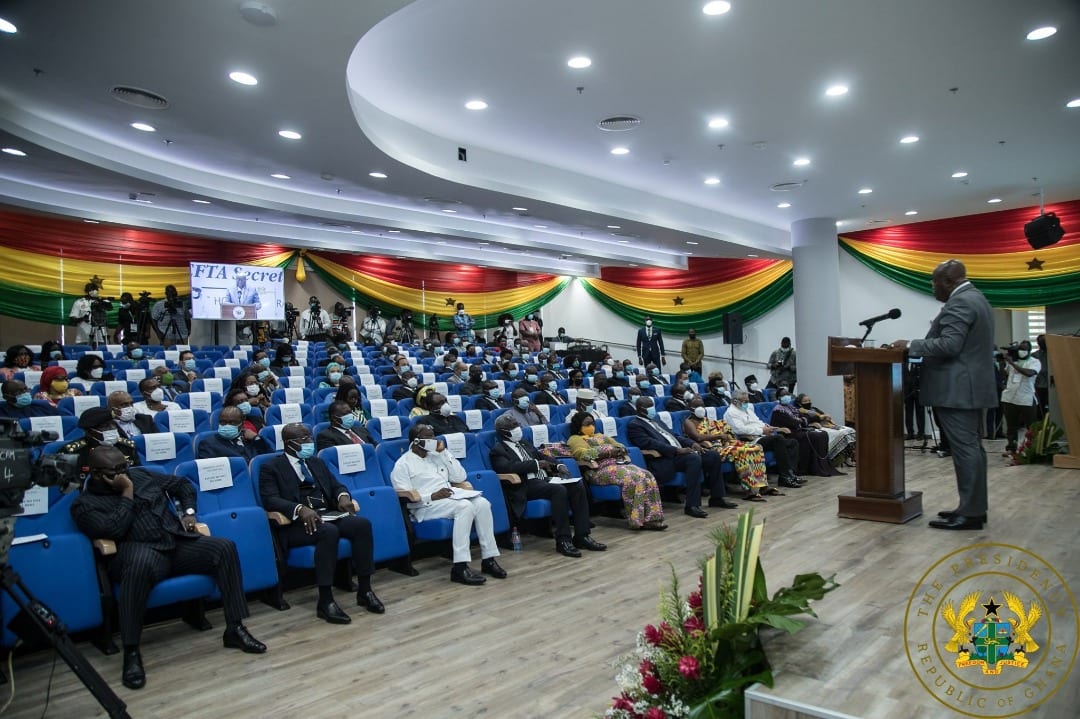
President of the Republic of Niger, H.E. Mahamadou Issoufou, sent a supporting message by video since he was unable to attend the official ceremony. He was praised throughout the event for his championing of the AfCFTA.
President Akufo-Addo handed over the symbolic key to the newly commissioned Secretariate Office to the Chairperson of the African Union, Abdel Fattah el-Sisi, President of Egypt. Shortly after the ceremony ended and selected persons were given a tour of the new facility.
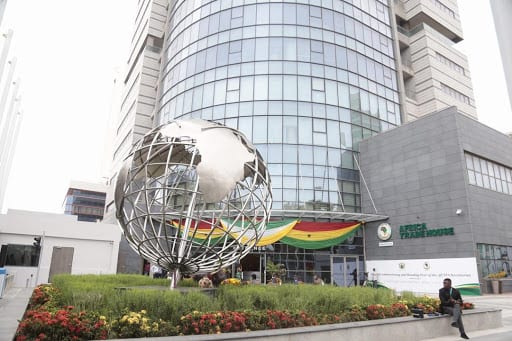
Earlier This Year
H.E. Wamkele Mene, of South Africa, was elected as the first Secretary-General of the African Continental Free Trade Area Secretariat. He was sworn in on 19th March 2020 for a four-year period and would be based in the new Secretariate office located in Accra, Ghana. His role is to lead the Secretariate in daily strategies to support the implementation of the AfCFTA Agreement.
The ‘Agenda 2063’: The Africa We Want, is the flagship initiative of the AfCFTA. This is a plan for transforming Africa into a global competitor. With goals to work on a strategic framework for the continent’s drive for unity, progress and prosperity. The AfCFTA will be focused on building intra-African trade through mutually beneficial trade agreements with member states. This will cover trade in goods, investments, services and intellectual property rights. There is also the goal of increasing Africa’s current intra-trade levels of 10-13% to 25% or more over the next 10 years.
The Agenda 2063 documents can be found on the African Union website.
By: Ivy Prosper
Ghana Restarts Tourism With Re-opening of Tourist Sites
After the easing of COVID-19 restriction by the President of Ghana recently, most of Ghana’s major tourist attractions are gradually being opened to the public with precautionary measures in place to cater to the safety of the touring public. These are part of efforts by the Ghana Tourism Authority to help boost domestic tourism and restart tourism in general and to boost the 10-year ‘Beyond The Return‘ initiative.
This is also in line with the global campaign by the UNWTO to get the tourism industry on track.
Ghana’s most visited attraction, the Kakum National Park was opened to the public on Saturday, 1st August, 2020.
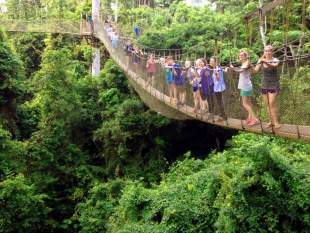
On Friday, August 8, 2020, the most visited attraction in the capital, Accra, the Kwame Nkrumah Memorial Park was also opened at a short ceremony where the Ghana Tourism Authority presented some Personal Protective Equipment to the Management of the facility to help keep patrons safe.
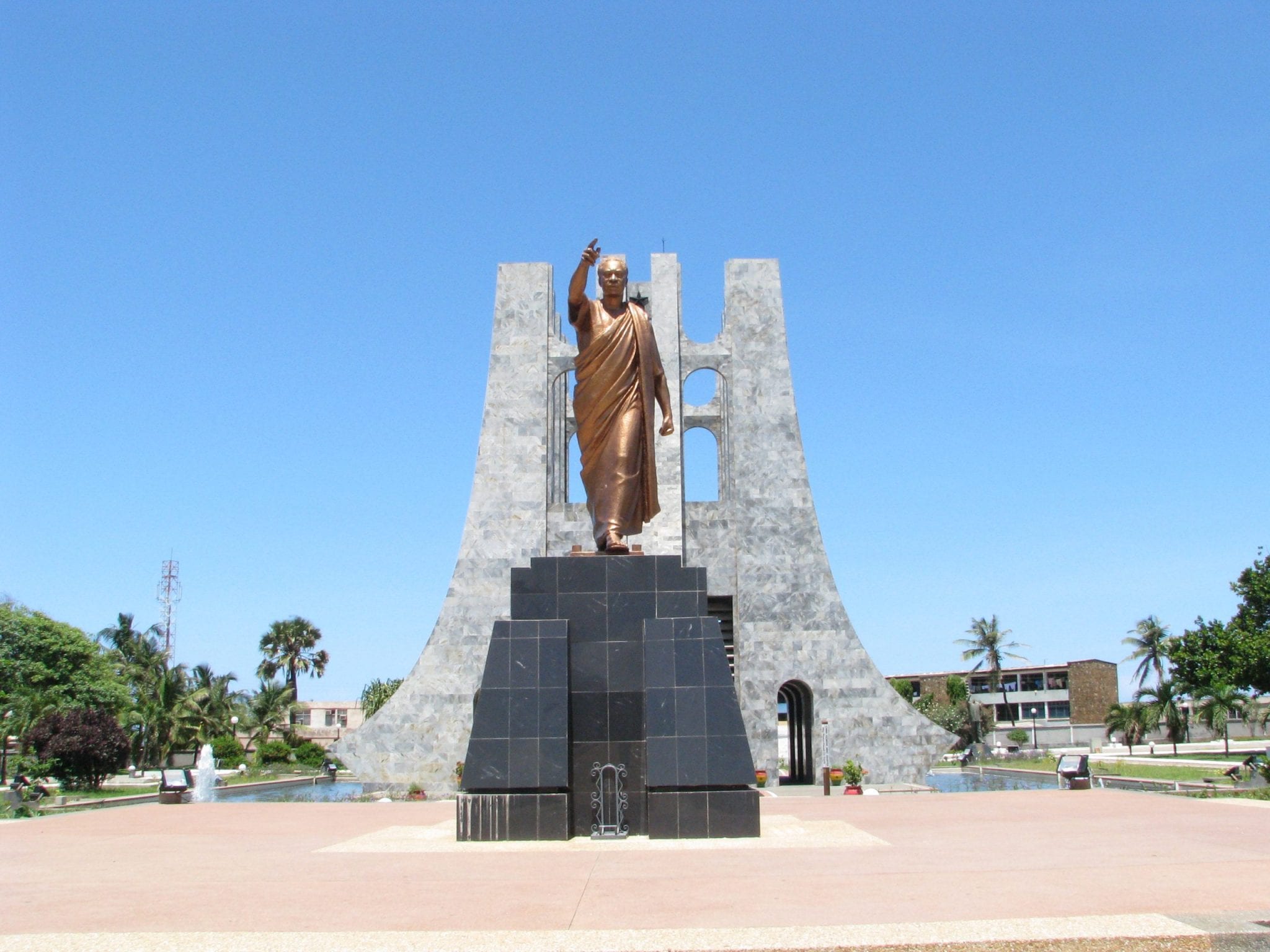
The Cape Coast and Elmina Castles are expected to open shortly to the public with the necessary COVID-19 measures in place ahead of the anticipated opening of the borders on September 1, 2020.
Stay tunned…
Back to the Motherland Documentary Now Streaming Worldwide
Back to the Motherland is a documentary film produced by Pamela Sakyi that explores the steps needed for relocating to Ghana. In the film, she highlights the testimonies of many Ghanaians who are living in the diaspora and embarking on the possibility of moving to Ghana.
The movie was endorsed as an official Year of Return event commemorating the 400-year anniversary of the first documented ship of enslaved Africans to arrive in Virginia. The movie debuted in October 2019 in London. Unfortunately, there were many diasporans who didn’t get the opportunity to watch the film at the time. This is why it’s exciting to announce that this movie is available to stream online worldwide.
In the film Pamela also investigates her own family’s history in the town of Berekum and she aims to learn about the ways she too can migrate into Ghana’s local culture and make her own contribution to the community and Ghana’s economy.
The movie touches on the many conversations people in the diaspora are having after answering the call to ‘return home’ to Africa. The documentary features Dentaa Amoateng MBE, CEO GUBA Enterprise, HE PApa Owusu-Ankomah, High Commissioner to the UK and Ireland and Lorissa Akua of The Only Way is Ghana and Co-Founder of The VillageGH and many more.
The movie is just £2 and you can view it today by signing in using this link: https://gumroad.com/sparklelight.
By: Ivy Prosper
2020 Emancipation Day and Reverential Night Celebrated in Cape Coast and Assin Manso
Emancipation Day is celebrated around the world to commemorate the liberation of black people from the system of chattel slavery. It was on August 1st, 1834 that slavery was abolished in the British Empire. Many countries celebrate the day around the world including Ghana, the first African country to celebrate it in 1998. This year’s theme for Emancipation Day was ‘Our Heritage Our Strength’ with the sub-theme of ‘Leveraging Our Resilience: Black Lives Matter’. Events were organized under the auspices of the Ministry of Tourism, Arts and Culture in collaboration with the Ghana Tourism Authority, and the traditional leaders in the community.
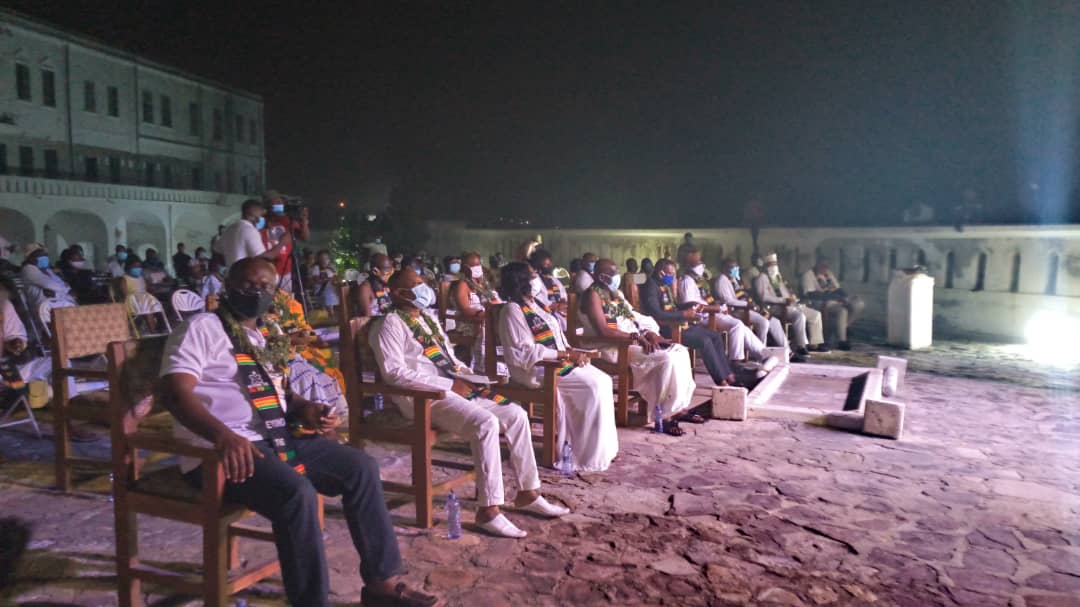
The night before Emancipation Day is known as Reverential Night and it is the night to pay homage the ancestors and light candles in their honour. In past years, a walk through the streets of Cape Coast, while wearing white, and singing songs of freedom occurs. Last year during the Year of Return over a thousand people gathered, but this year, because of the Covid-19 pandemic, the crowds were limited in number and the walk was shorted significantly.
Executive Director of PANAFEST Foundation, Rabbi Kohain started the candlelight vigil speaking to the small group gathered to remind us the significance of the night and that we were sharing each other’s light. The Minister of Tourism, Arts & Culture, Barbara Oteng-Gyasi, CEO of Ghana Tourism Authority, Akwasi Agyeman, Chairman of Diaspora Affairs, Akwasi Ababio, CEO of Ghana Tourist Development Company, Kojo Antwi, and Manager of Year of Return, Annabelle McKenzie were among the people leading the walk. The group was met by Paramount Chief of Cape Coast, Osabarima Kwesi Atta II and elders in the community who spoke briefly on the significance of calling on the ancestors to be with us in spirit as we celebrated the evening before Emancipation Day.
Limited numbers of people walked into the dungeons where a vigil held in honour of the ancestors. Prayers were said, a moment of silence was observed, and libations were poured to remember those who suffered. Seven candles were lit, and wreaths laid in memoriam, after which, everyone was led to the grounds where a celebration took place through theatre and dance that captured the theme of this year’s event. The National Theatre of Ghana’s actors did a moving performance that expressed the emotions surrounding the killings of innocent blacks in America as they called out the names of those who have lost their lives.
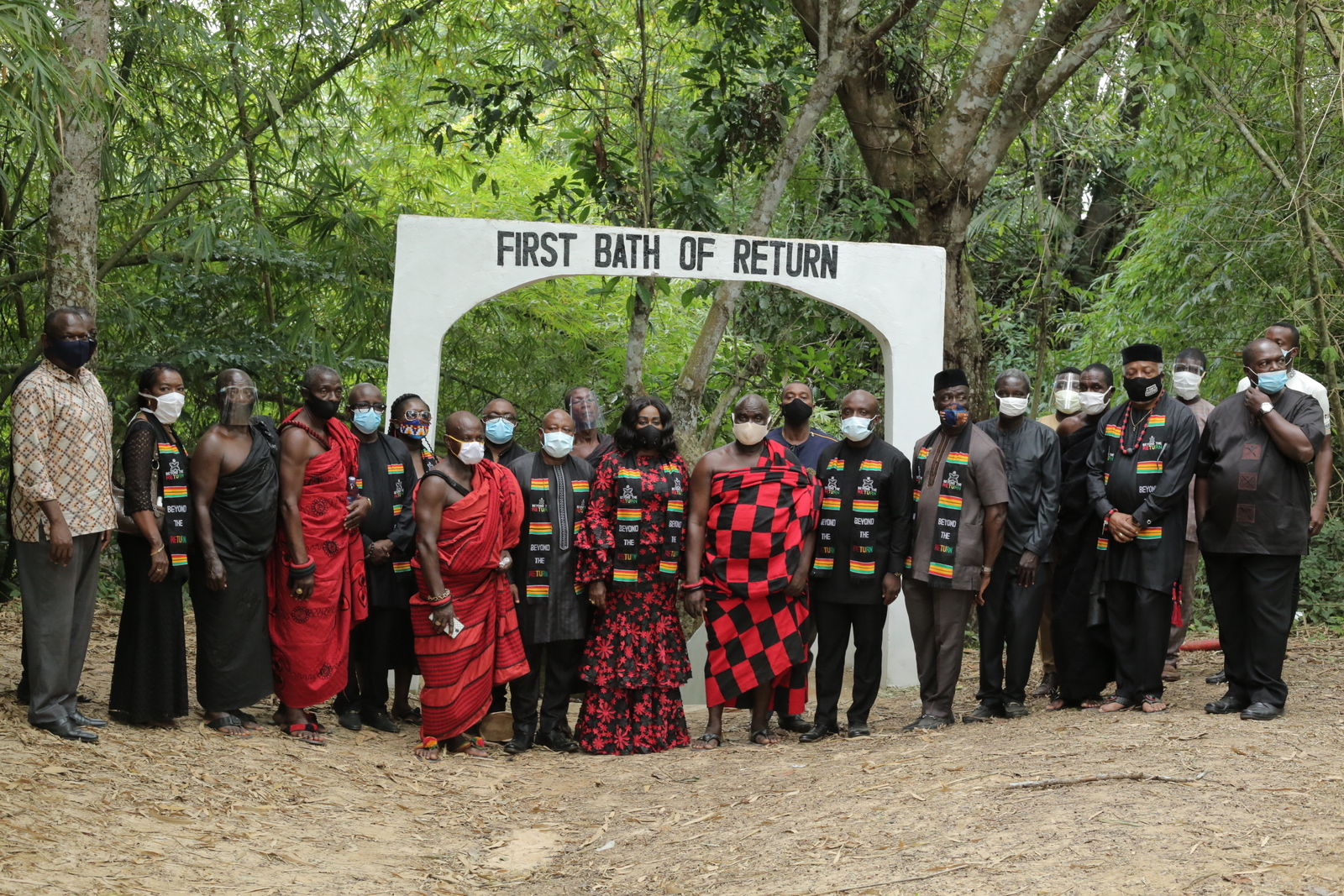
The Assin Manso community hosted the Emancipation Day events on August 1st on the historic grounds of the Slave Market and Memorial Park. A mini durbar of chiefs and the elders of the community took place while adhering to social distancing protocols. In memory of those who died during the trans-Atlantic slave trade, wreaths were laid in the Reverential Garden in front of the tombs of three enslaved Africans whose remains were repatriated to be buried on African soil; Samuel Carson from the United States, Crystal from Jamaica and the unknown enslaved African from Barbados.
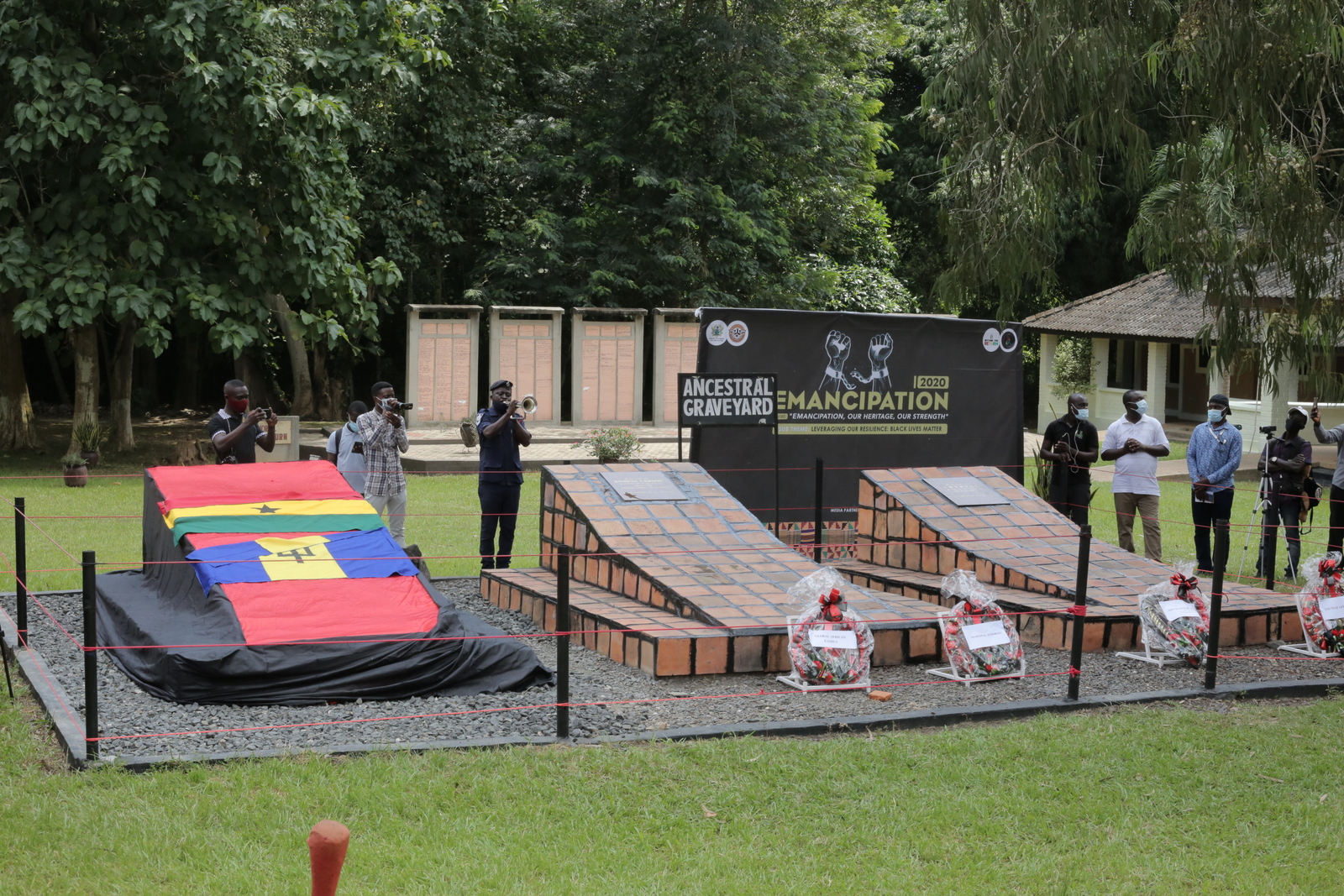
CEO of Ghana Tourism Authority, Akwasi Agyeman, said it was important for us to celebrate the resilience of the Africans who lost their lives during the slave trade. Hon. Barbara Oteng-Gyasi said, Emancipation Day reminds us that the African family was separated causing our people to suffer from the dramatic separation. She expressed the importance of our people coming together, “We must all reunite as one family and strive to build a more humane society…to achieve this we need our brothers and sisters of the diaspora to forge that closed bond between Africans and Africans in the diaspora to make Africa rise and shine.”
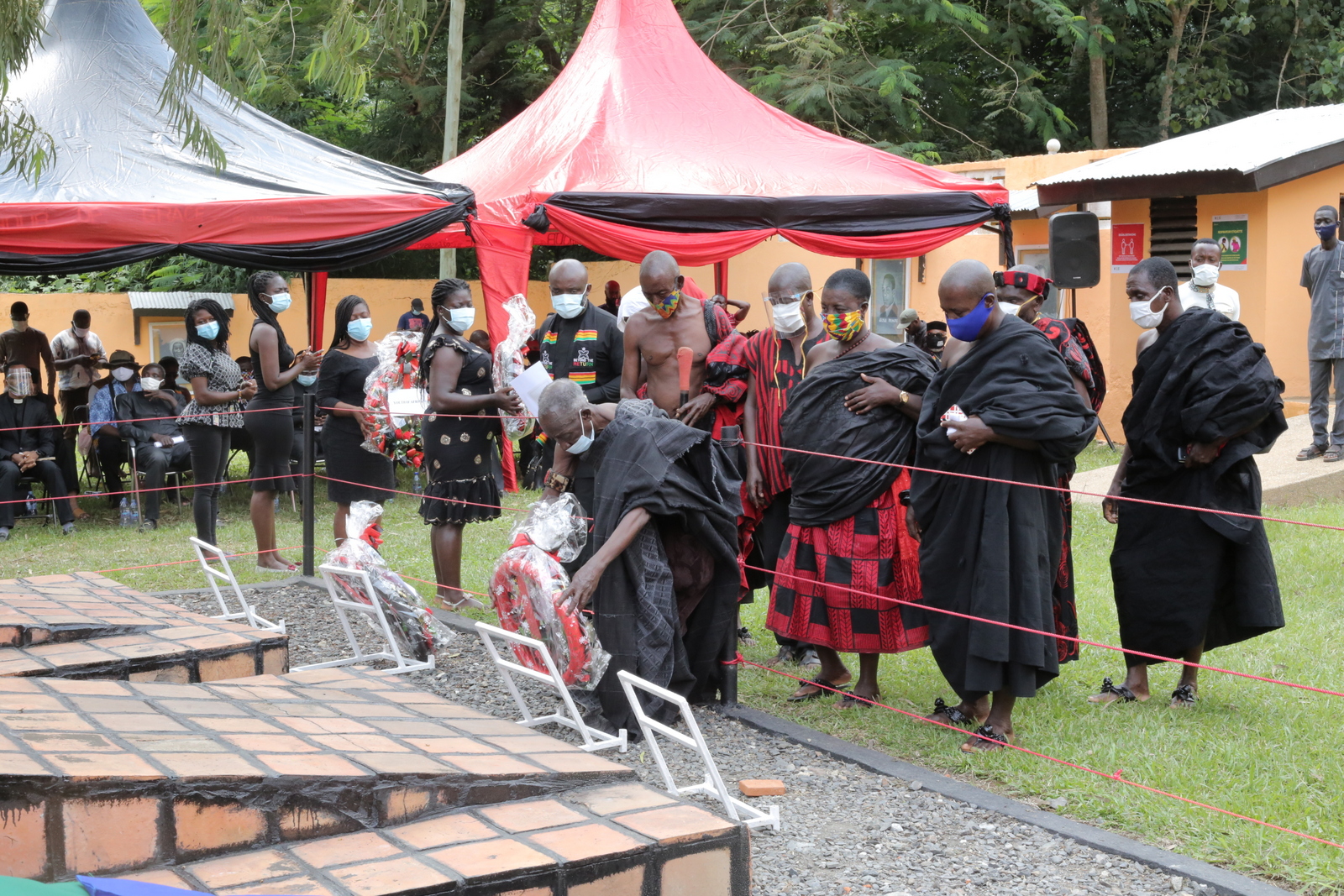
The day’s events ended at the site of the Ancestral Slave River known as the place where captured Africans were given their last bath before being taken into the dungeons where they were transported to the Americas into slavery. It was a moment of healing, reflection and prayers. The Chiefs and elders of the community observed a sacred moment as they gathered to pour libations and pray for the ancestors. Rabbi Kohain spoke to close out the day urging everyone to come together as one people and to free our minds from the shackles of what slavery and colonialism did. He urged everyone to tear down what separates us. “Let us be one people, let us be one African people no matter where we are and let us return the love, the virtue and respect to each other.”
Give Back Ghana Tree Planting for Emancipation Day
As part of Emancipation Day celebrations and the Give Back Ghana program for Beyond the Return, a team from Ghana Tourism Authority and the Beyond the Return Secretariat participated in a tree planting activity in Assin Praso in Ghana’s Central Region. Over 100 trees were planted along the path that leads to a historical site where captured enslaved Africans were taken hundreds of years ago in the height of the slave trade era. The contestants from Ghana’s Most Beautiful Pageant also joined in the day’s activities each planting a tree of her own.
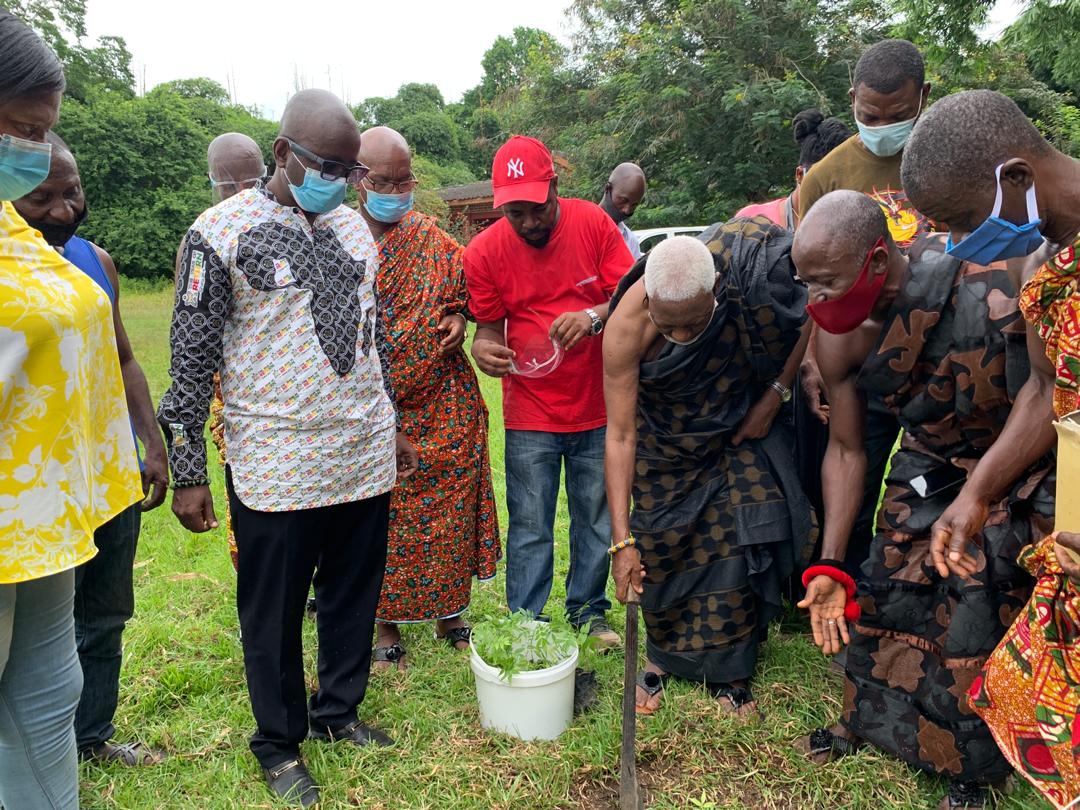
This important exercise is being done across the country with trees being planted in all of Ghana’s 16 regions. This is a way to give back to our environment and to also to build a better Ghana. It also serves as a symbolic gesture for future generations to see the trees we planted today. Manager of Beyond the Return, Annabelle McKenzie and Marketing Manager for Ghana Tourism Authority, Roberta Dawson-Amoah both participated in planting their own trees to help give back to and preserve Ghana’s environment.
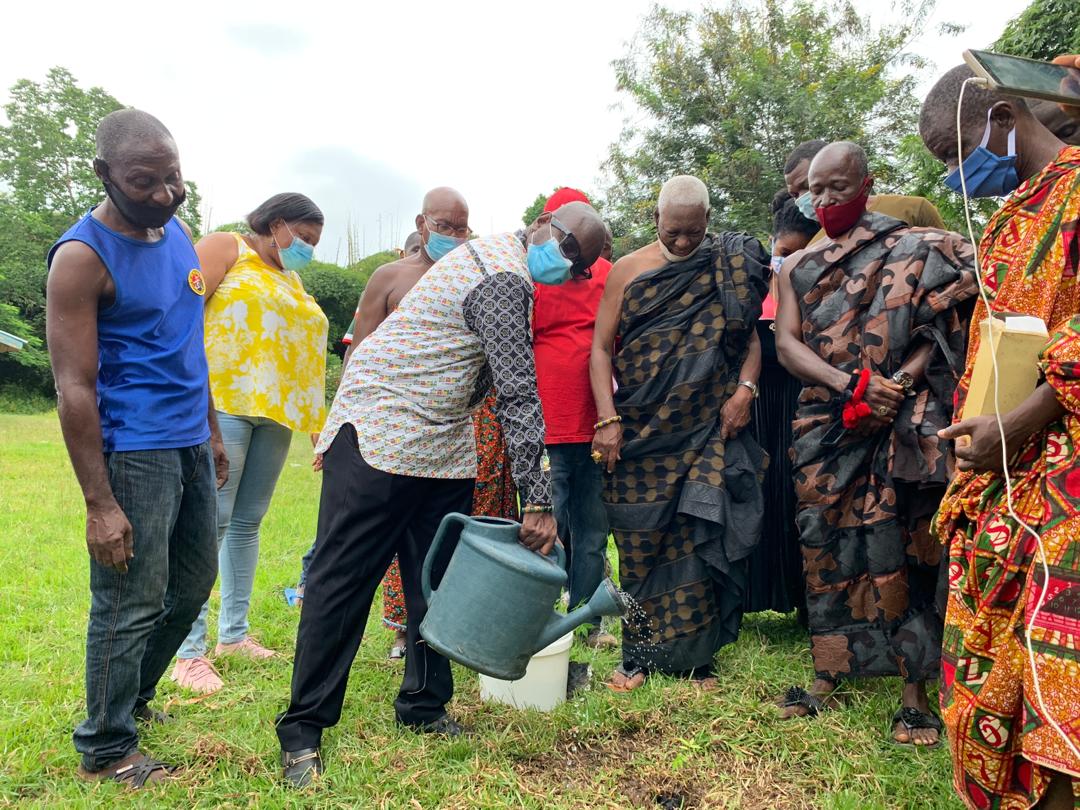
CEO of Ghana Tourism Authority, Akwasi Agyeman, welcomed everyone to the site. He said that every year Ghana celebrates the resilience of the African and the end to chattel slavery through its celebrations of Emancipation Day. He said that this year because of the circumstances we are in, due to the pandemic we are unable to do what normally takes place, which is the re-enactment of captured Africans crossing of the river during the time of slavery. “Beyond that story of what happened here during the slave trade, there are also two significant incidents,” Mr. Agyeman said. “The Yaa Asantewaa War against British colonialism and the Anglo – Asante War. Today we are going to plant trees as our way of celebrating emancipation so that future generations will come and see these trees planted as a symbol of what happened in 2020 when we couldn’t celebrate the way we normally do.”
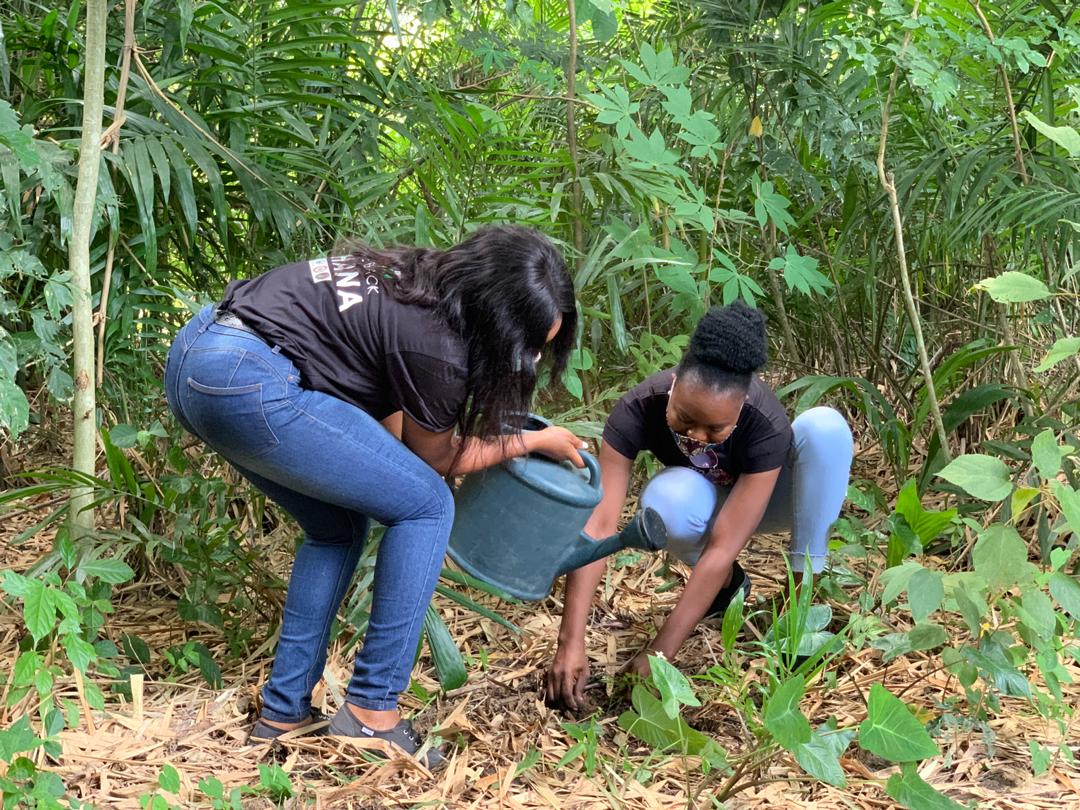
Over 100 trees were planted in Assin Praso along the path that leads to the historical site where the captured enslaved Africans were buried in mass graves. The contestants from Ghana’s Most Beautiful pageant listened attentively as they learned the history of the grounds that they were planting trees on. Like some Ghanaians, they were learning this history for the first time.
Divisional Chief of Assin Jakai-Assin Praso, Nana Owodo Aseku X, spoke to everyone and recounted the history of Assin Praso along with the significance of the site which is now a popular tourist attraction. He was also joined by other elders in the community including Nana Baffour Adjei X, and Nana Yaw Owusu Aduemi, as they shared stories of history in their community.
Assin Praso was one of the busiest tourist sites last year during the Year of Return. Many people from the diaspora came to see the grounds where Africans were buried in mass graves and the river that was crossed during that time.
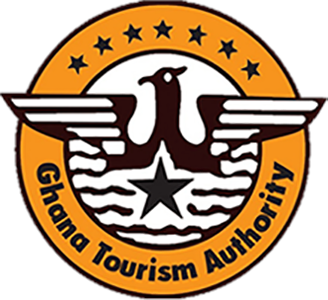

 Call Center
Call Center
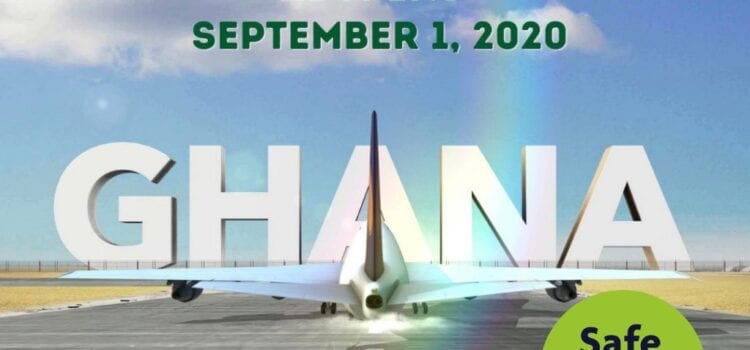
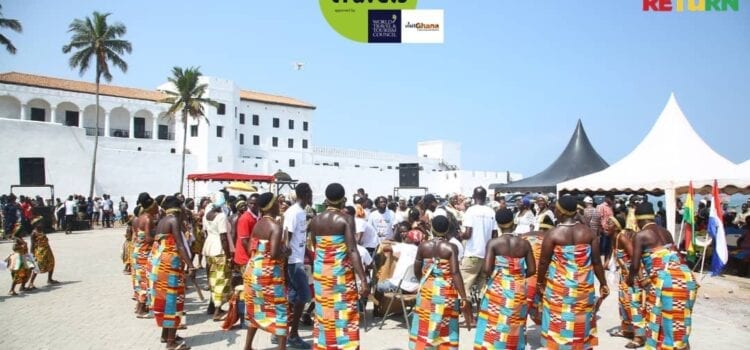

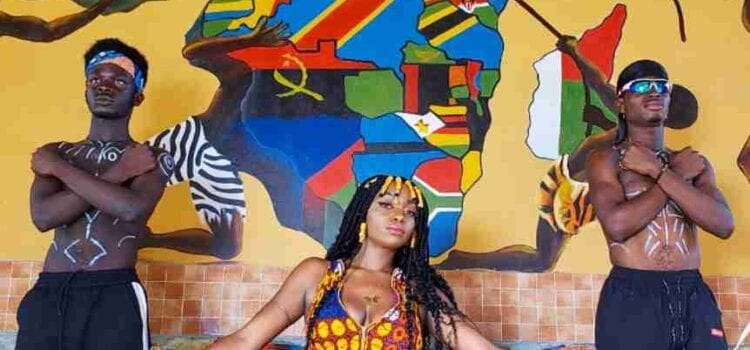
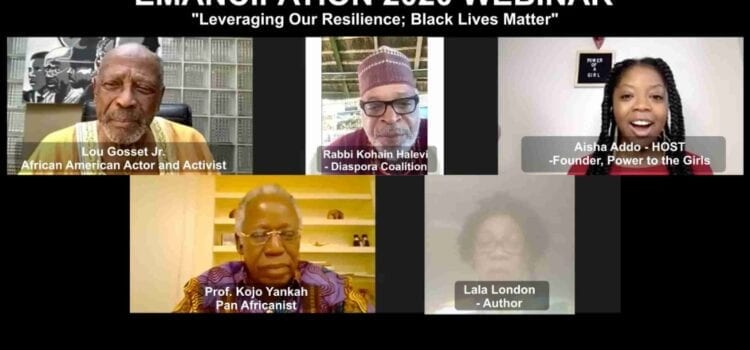
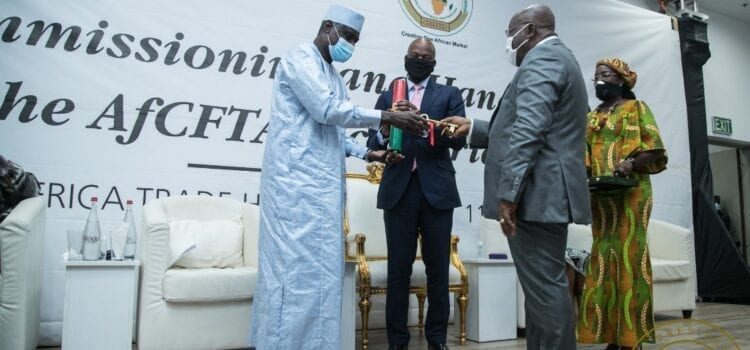
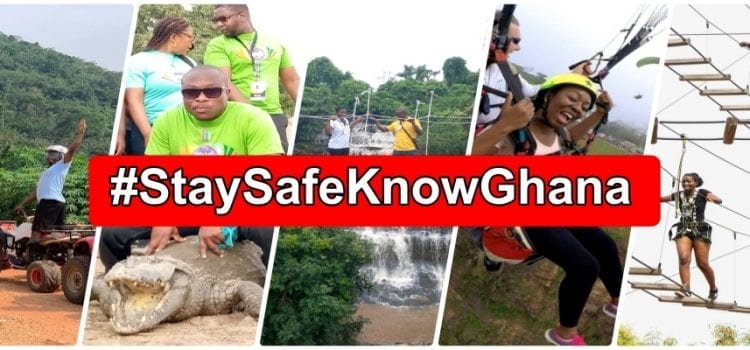
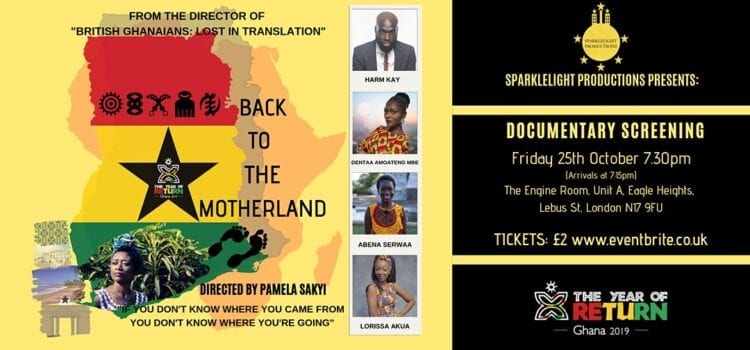
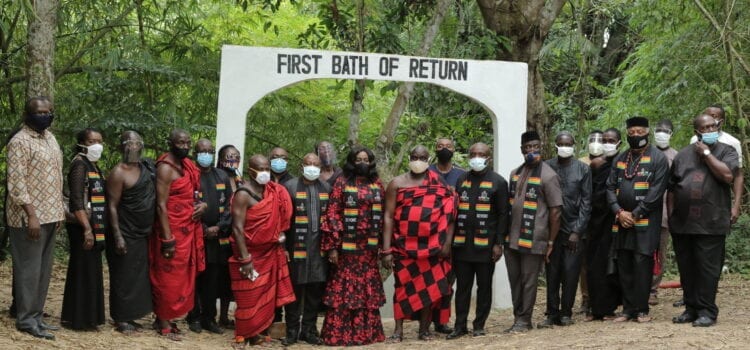
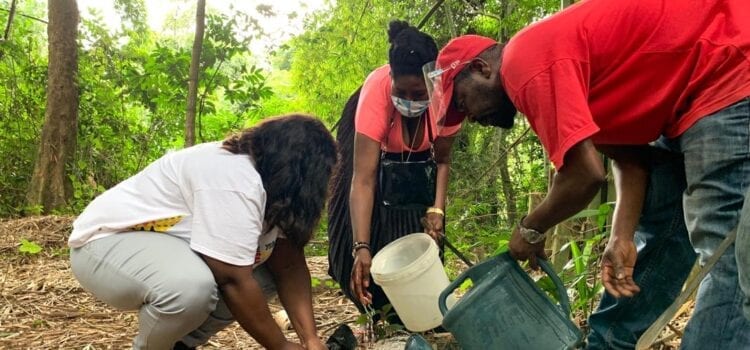
 Call Center: 0307007100
Call Center: 0307007100